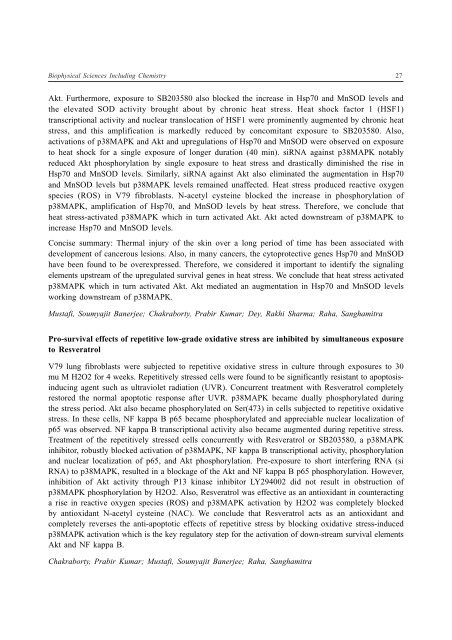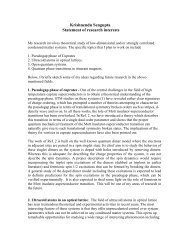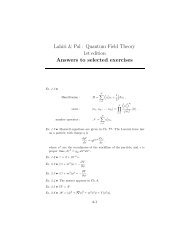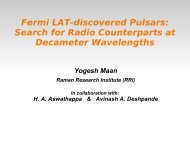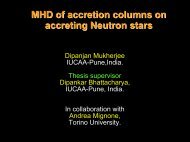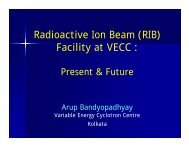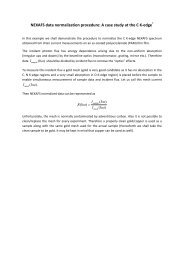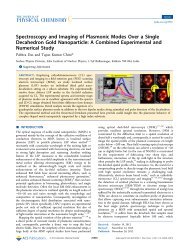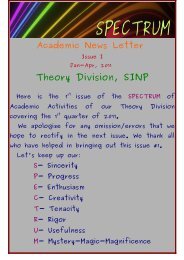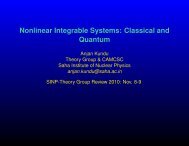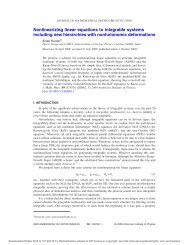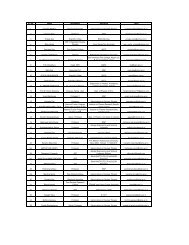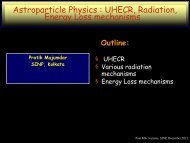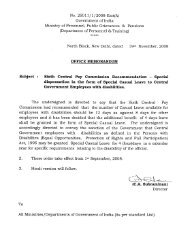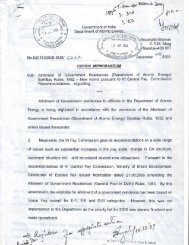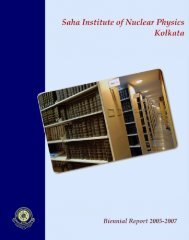- Page 20 and 21: 1 Biophysical Sciences Including Ch
- Page 22 and 23: Biophysical Sciences Including Chem
- Page 24 and 25: Biophysical Sciences Including Chem
- Page 26 and 27: Biophysical Sciences Including Chem
- Page 28 and 29: Biophysical Sciences Including Chem
- Page 30 and 31: Biophysical Sciences Including Chem
- Page 32 and 33: Biophysical Sciences Including Chem
- Page 34 and 35: Biophysical Sciences Including Chem
- Page 36 and 37: Biophysical Sciences Including Chem
- Page 38 and 39: Biophysical Sciences Including Chem
- Page 40 and 41: Biophysical Sciences Including Chem
- Page 42 and 43: Biophysical Sciences Including Chem
- Page 44 and 45: Biophysical Sciences Including Chem
- Page 48 and 49: Biophysical Sciences Including Chem
- Page 50 and 51: Biophysical Sciences Including Chem
- Page 52 and 53: Biophysical Sciences Including Chem
- Page 54 and 55: Biophysical Sciences Including Chem
- Page 56 and 57: Biophysical Sciences Including Chem
- Page 58 and 59: Biophysical Sciences Including Chem
- Page 60 and 61: Biophysical Sciences Including Chem
- Page 62 and 63: Biophysical Sciences Including Chem
- Page 64 and 65: Biophysical Sciences Including Chem
- Page 66 and 67: Biophysical Sciences Including Chem
- Page 68 and 69: Biophysical Sciences Including Chem
- Page 70 and 71: Biophysical Sciences Including Chem
- Page 72 and 73: Biophysical Sciences Including Chem
- Page 74 and 75: Biophysical Sciences Including Chem
- Page 76 and 77: Biophysical Sciences Including Chem
- Page 78 and 79: Biophysical Sciences Including Chem
- Page 80 and 81: Biophysical Sciences Including Chem
- Page 82 and 83: Biophysical Sciences Including Chem
- Page 84 and 85: Biophysical Sciences Including Chem
- Page 86 and 87: Biophysical Sciences Including Chem
- Page 88 and 89: Biophysical Sciences Including Chem
- Page 90 and 91: Biophysical Sciences Including Chem
- Page 92 and 93: Biophysical Sciences Including Chem
- Page 94 and 95: Biophysical Sciences Including Chem
- Page 96 and 97:
Biophysical Sciences Including Chem
- Page 98 and 99:
Biophysical Sciences Including Chem
- Page 100 and 101:
Biophysical Sciences Including Chem
- Page 102 and 103:
Biophysical Sciences Including Chem
- Page 104 and 105:
Biophysical Sciences Including Chem
- Page 107 and 108:
2 Condensed Matter Physics Includin
- Page 109 and 110:
Condensed Matter Physics including
- Page 111 and 112:
Condensed Matter Physics including
- Page 113 and 114:
Condensed Matter Physics including
- Page 115 and 116:
Condensed Matter Physics including
- Page 117 and 118:
Condensed Matter Physics including
- Page 119 and 120:
Condensed Matter Physics including
- Page 121 and 122:
Condensed Matter Physics including
- Page 123 and 124:
Condensed Matter Physics including
- Page 125 and 126:
Condensed Matter Physics including
- Page 127 and 128:
Condensed Matter Physics including
- Page 129 and 130:
Condensed Matter Physics including
- Page 131 and 132:
Condensed Matter Physics including
- Page 133 and 134:
Condensed Matter Physics including
- Page 135 and 136:
Condensed Matter Physics including
- Page 137 and 138:
Condensed Matter Physics including
- Page 139 and 140:
Condensed Matter Physics including
- Page 141 and 142:
Condensed Matter Physics including
- Page 143 and 144:
Condensed Matter Physics including
- Page 145 and 146:
Condensed Matter Physics including
- Page 147 and 148:
Condensed Matter Physics including
- Page 149 and 150:
Condensed Matter Physics including
- Page 151 and 152:
Condensed Matter Physics including
- Page 153 and 154:
Condensed Matter Physics including
- Page 155 and 156:
Condensed Matter Physics including
- Page 157 and 158:
Condensed Matter Physics including
- Page 159 and 160:
Condensed Matter Physics including
- Page 161 and 162:
Condensed Matter Physics including
- Page 163 and 164:
Condensed Matter Physics including
- Page 165 and 166:
Condensed Matter Physics including
- Page 167 and 168:
Condensed Matter Physics including
- Page 169 and 170:
Condensed Matter Physics including
- Page 171 and 172:
Condensed Matter Physics including
- Page 173 and 174:
Condensed Matter Physics including
- Page 175 and 176:
Condensed Matter Physics including
- Page 177 and 178:
Condensed Matter Physics including
- Page 179 and 180:
Condensed Matter Physics including
- Page 181 and 182:
Condensed Matter Physics including
- Page 183 and 184:
Condensed Matter Physics including
- Page 185 and 186:
Condensed Matter Physics including
- Page 187 and 188:
Condensed Matter Physics including
- Page 189 and 190:
Condensed Matter Physics including
- Page 191 and 192:
Condensed Matter Physics including
- Page 193 and 194:
Condensed Matter Physics including
- Page 195 and 196:
Condensed Matter Physics including
- Page 197 and 198:
Condensed Matter Physics including
- Page 199 and 200:
Condensed Matter Physics including
- Page 201 and 202:
Condensed Matter Physics including
- Page 203 and 204:
Condensed Matter Physics including
- Page 205 and 206:
Condensed Matter Physics including
- Page 207 and 208:
Condensed Matter Physics including
- Page 209 and 210:
Condensed Matter Physics including
- Page 211 and 212:
Condensed Matter Physics including
- Page 213 and 214:
Condensed Matter Physics including
- Page 215 and 216:
Condensed Matter Physics including
- Page 217 and 218:
Condensed Matter Physics including
- Page 220 and 221:
3 Experimental Nuclear and Particle
- Page 222 and 223:
Experimental Nuclear & Particle Phy
- Page 224 and 225:
Experimental Nuclear & Particle Phy
- Page 226 and 227:
Experimental Nuclear & Particle Phy
- Page 228 and 229:
Experimental Nuclear & Particle Phy
- Page 230 and 231:
Experimental Nuclear & Particle Phy
- Page 232 and 233:
Experimental Nuclear & Particle Phy
- Page 234 and 235:
Experimental Nuclear & Particle Phy
- Page 236 and 237:
Experimental Nuclear & Particle Phy
- Page 238 and 239:
Experimental Nuclear & Particle Phy
- Page 240 and 241:
Experimental Nuclear & Particle Phy
- Page 242 and 243:
Experimental Nuclear & Particle Phy
- Page 244 and 245:
Experimental Nuclear & Particle Phy
- Page 246 and 247:
Experimental Nuclear & Particle Phy
- Page 248 and 249:
Experimental Nuclear & Particle Phy
- Page 250 and 251:
Experimental Nuclear & Particle Phy
- Page 252 and 253:
Experimental Nuclear & Particle Phy
- Page 254 and 255:
Experimental Nuclear & Particle Phy
- Page 256 and 257:
Experimental Nuclear & Particle Phy
- Page 258 and 259:
Experimental Nuclear & Particle Phy
- Page 260 and 261:
Experimental Nuclear & Particle Phy
- Page 262 and 263:
Experimental Nuclear & Particle Phy
- Page 264 and 265:
Experimental Nuclear & Particle Phy
- Page 266 and 267:
Experimental Nuclear & Particle Phy
- Page 268 and 269:
Experimental Nuclear & Particle Phy
- Page 270 and 271:
Experimental Nuclear & Particle Phy
- Page 272 and 273:
Experimental Nuclear & Particle Phy
- Page 274 and 275:
Experimental Nuclear & Particle Phy
- Page 276 and 277:
Experimental Nuclear & Particle Phy
- Page 278 and 279:
Experimental Nuclear & Particle Phy
- Page 280 and 281:
Experimental Nuclear & Particle Phy
- Page 283 and 284:
Plasma Physics 4 Plasma Physics and
- Page 285 and 286:
Plasma Physics and Electronics 263
- Page 287 and 288:
Plasma Physics and Electronics 265
- Page 289 and 290:
Plasma Physics and Electronics 267
- Page 291 and 292:
Plasma Physics and Electronics 269
- Page 293 and 294:
Plasma Physics and Electronics 271
- Page 295 and 296:
Plasma Physics and Electronics 273
- Page 298 and 299:
5 Theoretical Physics Including Mat
- Page 300 and 301:
Theoretical Physics including Mathe
- Page 302 and 303:
Theoretical Physics including Mathe
- Page 304 and 305:
Theoretical Physics including Mathe
- Page 306 and 307:
Theoretical Physics including Mathe
- Page 308 and 309:
Theoretical Physics including Mathe
- Page 310 and 311:
Theoretical Physics including Mathe
- Page 312 and 313:
Theoretical Physics including Mathe
- Page 314 and 315:
Theoretical Physics including Mathe
- Page 316 and 317:
Theoretical Physics including Mathe
- Page 318 and 319:
Theoretical Physics including Mathe
- Page 320 and 321:
Theoretical Physics including Mathe
- Page 322 and 323:
Theoretical Physics including Mathe
- Page 324 and 325:
Theoretical Physics including Mathe
- Page 326 and 327:
Theoretical Physics including Mathe
- Page 328 and 329:
Theoretical Physics including Mathe
- Page 330 and 331:
Theoretical Physics including Mathe
- Page 332 and 333:
Theoretical Physics including Mathe
- Page 334 and 335:
Theoretical Physics including Mathe
- Page 336 and 337:
Theoretical Physics including Mathe
- Page 338 and 339:
Theoretical Physics including Mathe
- Page 340 and 341:
Theoretical Physics including Mathe
- Page 342 and 343:
Theoretical Physics including Mathe
- Page 344 and 345:
Theoretical Physics including Mathe
- Page 346 and 347:
Theoretical Physics including Mathe
- Page 348 and 349:
Theoretical Physics including Mathe
- Page 350 and 351:
Theoretical Physics including Mathe
- Page 352 and 353:
Theoretical Physics including Mathe
- Page 354 and 355:
Theoretical Physics including Mathe
- Page 356 and 357:
Theoretical Physics including Mathe
- Page 358 and 359:
Theoretical Physics including Mathe
- Page 360 and 361:
Theoretical Physics including Mathe
- Page 362 and 363:
Theoretical Physics including Mathe
- Page 364 and 365:
Theoretical Physics including Mathe
- Page 366 and 367:
344 Triennial Report 2007-10 Nupur
- Page 368 and 369:
346 Triennial Report 2007-10 7. Mea
- Page 370 and 371:
348 Triennial Report 2007-10 First
- Page 372 and 373:
350 Triennial Report 2007-10 Srilek
- Page 374 and 375:
352 Triennial Report 2007-10 Binita
- Page 376 and 377:
354 Triennial Report 2007-10 A Shor
- Page 378 and 379:
356 Triennial Report 2007-10 Summer
- Page 380 and 381:
358 Triennial Report 2007-10 Subir
- Page 382 and 383:
360 Triennial Report 2007-10 Plasma
- Page 384 and 385:
362 Triennial Report 2007-10 Crysta
- Page 386 and 387:
364 Triennial Report 2007-10 DAE-BR
- Page 388 and 389:
Academic Review of the Institute Su
- Page 390 and 391:
Computer Developmental Work 9 Facil
- Page 392 and 393:
Facility 371 Electronics Workshop F
- Page 394 and 395:
Facility 373 Library has the online
- Page 396 and 397:
Facility 375 skill in welding of th
- Page 398 and 399:
GOVERNING COUNCIL 10 Administration
- Page 400 and 401:
Administration 379 CAPITAL FUND & L
- Page 402 and 403:
Administration 381 SAHA INSTITUTE O
- Page 404 and 405:
Administration 383 SAHA INSTITUTE O
- Page 406 and 407:
Administration 385 CAPITAL FUND & L
- Page 408 and 409:
Administration 387 SAHA INSTITUTE O
- Page 410 and 411:
390 Triennial Report 2007-10 6A. DO
- Page 412 and 413:
392 Triennial Report 2007-10 15. Sr
- Page 414 and 415:
394 Triennial Report 2007-10 2. Pro
- Page 416 and 417:
396 Triennial Report 2007-10 Cantee
- Page 418 and 419:
398 Triennial Report 2007-10 Medica
- Page 420 and 421:
400 Triennial Report 2007-10 Techni
- Page 422 and 423:
402 Triennial Report 2007-10 Techni
- Page 424 and 425:
404 Triennial Report 2007-10 Scient
- Page 426 and 427:
406 Triennial Report 2007-10 Techni
- Page 428 and 429:
408 Triennial Report 2007-10 Scient
- Page 430 and 431:
410 Triennial Report 2007-10 Auxili
- Page 432 and 433:
412 Triennial Report 2007-10 List o
- Page 434 and 435:
414 Triennial Report 2007-10 Biswas
- Page 436 and 437:
416 Triennial Report 2007-10 Lahiri
- Page 438:
418 Triennial Report 2007-10 Shyam,


